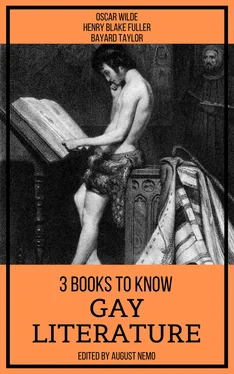“Not at all,” answered Lord Henry, “not at all, my dear Basil. You seem to forget that I am married, and the one charm of marriage is that it makes a life of deception absolutely necessary for both parties. I never know where my wife is, and my wife never knows what I am doing. When we meet — we do meet occasionally, when we dine out together, or go down to the Duke’s — we tell each other the most absurd stories with the most serious faces. My wife is very good at it — much better, in fact, than I am. She never gets confused over her dates, and I always do. But when she does find me out, she makes no row at all. I sometimes wish she would; but she merely laughs at me.”
“I hate the way you talk about your married life, Harry,” said Basil Hallward, strolling towards the door that led into the garden. “I believe that you are really a very good husband, but that you are thoroughly ashamed of your own virtues. You are an extraordinary fellow. You never say a moral thing, and you never do a wrong thing. Your cynicism is simply a pose.”
“Being natural is simply a pose, and the most irritating pose I know,” cried Lord Henry, laughing; and the two young men went out into the garden together, and ensconced themselves on a long bamboo seat that stood in the shade of a tall laurel bush. The sunlight slipped over the polished leaves. In the grass, white daisies were tremulous.
After a pause, Lord Henry pulled out his watch. “I am afraid I must be going, Basil,” he murmured, “and before I go, I insist on your answering a question I put to you some time ago.”
“What is that?” said the painter, keeping his eyes fixed on the ground.
“You know quite well.”
“I do not, Harry.”
“Well, I will tell you what it is. I want you to explain to me why you won’t exhibit Dorian Gray’s picture. I want the real reason.”
“I told you the real reason.”
“No, you did not. You said it was because there was too much of yourself in it. Now, that is childish.”
“Harry,” said Basil Hallward, looking him straight in the face, “every portrait that is painted with feeling is a portrait of the artist, not of the sitter. The sitter is merely the accident, the occasion. It is not he who is revealed by the painter; it is rather the painter who, on the coloured canvas, reveals himself. The reason I will not exhibit this picture is that I am afraid that I have shown in it the secret of my own soul.”
Lord Henry laughed. “And what is that?” he asked.
“I will tell you,” said Hallward; but an expression of perplexity came over his face.
“I am all expectation, Basil,” continued his companion, glancing at him.
“Oh, there is really very little to tell, Harry,” answered the painter; “and I am afraid you will hardly understand it. Perhaps you will hardly believe it.”
Lord Henry smiled, and, leaning down, plucked a pink-petalled daisy from the grass, and examined it. “I am quite sure I shall understand it,” he replied, gazing intently at the little golden white-feathered disk, “and as for believing things, I can believe anything, provided that it is quite incredible.”
The wind shook some blossoms from the trees, and the heavy lilac-blooms, with their clustering stars, moved to and fro in the languid air. A grasshopper began to chirrup by the wall, and like a blue thread a long thin dragon-fly floated past on its brown gauze wings. Lord Henry felt as if he could hear Basil Hallward’s heart beating, and wondered what was coming.
“The story is simply this,” said the painter after some time. “Two months ago I went to a crush at Lady Brandon’s . You know we poor artists have to show ourselves in society from time to time, just to remind the public that we are not savages. With an evening coat and a white tie, as you told me once, anybody, even a stockbroker, can gain a reputation for being civilised. Well, after I had been in the room about ten minutes, talking to huge over-dressed dowagers and tedious Academicians, I suddenly became conscious that someone was looking at me. I turned halfway round, and saw Dorian Gray for the first time. When our eyes met, I felt that I was growing pale. A curious sensation of terror came over me. I knew that I had come face to face with someone whose mere personality was so fascinating that, if I allowed it to do so, it would absorb my whole nature, my whole soul, my very art itself. I did not want any external influence in my life. You know yourself, Harry, how independent I am by nature. I have always been my own master; had at least always been so, till I met Dorian Gray. Then —— but I don’t know how to explain it to you. Something seemed to tell me that I was on the verge of a terrible crisis in my life. I had a strange feeling that Fate had in store for me exquisite joys and exquisite sorrows. I grew afraid, and turned to quit the room. It was not conscience that made me do so; it was a sort of cowardice. I take no credit to myself for trying to escape.”
“Conscience and cowardice are really the same things, Basil. Conscience is the trade-name of the firm. That is all.”
“I don’t believe that, Harry, and I don’t believe you do either. However, whatever was my motive — and it may have been pride, for I used to be very proud — I certainly struggled to the door. There, of course, I stumbled against Lady Brandon. ‘You are not going to run away so soon, Mr. Hallward?’ she screamed out. You know her curiously shrill voice?”
“Yes; she is a peacock in everything but beauty,” said Lord Henry, pulling the daisy to bits with his long, nervous fingers.
“I could not get rid of her. She brought me up to Royalties, and people with Stars and Garters, and elderly ladles with gigantic tiaras and parrot noses. She spoke of me as her dearest friend. I had only met her once before, but she took it into her head to lionise me. I believe some picture of mine had made a great success at the time, at least had been chattered about in the penny newspapers, which is the nineteenth-century standard of immortality. Suddenly I found myself face to face with the young man whose personality had so strangely stirred me. We were quite close, almost touching. Our eyes met again. It was reckless of me, but I asked Lady Brandon to introduce me to him. Perhaps it was not so reckless, after all. It was simply inevitable. We would have spoken to each other without any introduction. I am sure of that. Dorian told me so afterwards. He, too, felt that we were destined to know each other.”
“And how did Lady Brandon describe this wonderful young man?” asked his companion. “I know she goes in for giving a rapid précis of all her guests. I remember her bringing me up to a truculent and red-faced old gentleman covered all over with orders and ribbons, and hissing into my ear, in a tragic whisper which must have been perfectly audible to everybody in the room, the most astounding details. I simply fled. I like to find out people for myself. But Lady Brandon treats her guests exactly as an auctioneer treats his goods. She either explains them entirely away, or tells one everything about them except what one wants to know.”
“Poor Lady Brandon! You are hard on her, Harry!” said Hallward, listlessly.
“My dear fellow, she tried to found a salon, and only succeeded in opening a restaurant. How could I admire her? But tell me, what did she say about Mr. Dorian Gray?”
“Oh, something like, ‘Charming boy — poor dear mother and I absolutely inseparable. Quite forget what he does — afraid he — doesn’t do anything — oh, yes, plays the piano — or is it the violin, dear Mr. Gray?’ Neither of us could help laughing, and we became friends at once.”
“Laughter is not at all a bad beginning for a friendship, and it is far the best ending for one,” said the young lord, plucking another daisy.
Читать дальше












